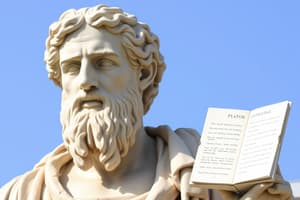Podcast
Questions and Answers
What does Socrates suggest is the significance of death?
What does Socrates suggest is the significance of death?
- A punishment for earthly sins.
- A complete cessation of existence.
- An opportunity for physical rebirth.
- A transition to a higher realm of understanding. (correct)
In the dialogue, what is the main role of Phaedo?
In the dialogue, what is the main role of Phaedo?
- To create new philosophical theories.
- To challenge Socrates' arguments.
- To represent the voice of dissent.
- To record and report Socrates' conversations. (correct)
How does Socrates describe the state of the soul after death?
How does Socrates describe the state of the soul after death?
- As imprisoned within the physical realm.
- As released to the realm of pure Forms. (correct)
- As losing its identity completely.
- As experiencing eternal suffering.
What is emphasized as essential for preparing for death in the final scene?
What is emphasized as essential for preparing for death in the final scene?
What impact has the Phaedo had on philosophical thought?
What impact has the Phaedo had on philosophical thought?
What is the main theme of Plato's Phaedo?
What is the main theme of Plato's Phaedo?
What does Socrates argue differentiates the soul from the body?
What does Socrates argue differentiates the soul from the body?
Which argument does Socrates use to suggest the soul exists before birth?
Which argument does Socrates use to suggest the soul exists before birth?
How does Socrates characterize the relationship between the soul and the body?
How does Socrates characterize the relationship between the soul and the body?
What are the Forms according to Socrates?
What are the Forms according to Socrates?
What is the significance of opposites in Socrates' argument?
What is the significance of opposites in Socrates' argument?
What distinguishes true knowledge according to Socrates?
What distinguishes true knowledge according to Socrates?
Which of the following best describes Socrates' view of the body?
Which of the following best describes Socrates' view of the body?
Flashcards
Socrates' View of Death
Socrates' View of Death
The belief that death is not the end of existence, but a transition to a higher realm of pure forms where the soul is free from the limitations of the physical body.
Realm of Pure Forms
Realm of Pure Forms
A state where the soul is freed from the constraints of the physical body and can access a higher level of understanding.
Phaedo's Role
Phaedo's Role
A student of Socrates, who plays a key role in recording and reporting Socrates' conversations.
The Phaedo Dialogue
The Phaedo Dialogue
Signup and view all the flashcards
Significance of Philosophizing
Significance of Philosophizing
Signup and view all the flashcards
Plato's Phaedo
Plato's Phaedo
Signup and view all the flashcards
Soul's Distinction from the Body
Soul's Distinction from the Body
Signup and view all the flashcards
Theory of Recollection
Theory of Recollection
Signup and view all the flashcards
Argument from Opposites
Argument from Opposites
Signup and view all the flashcards
The Forms
The Forms
Signup and view all the flashcards
True Knowledge of the Forms
True Knowledge of the Forms
Signup and view all the flashcards
The Body as a Prison
The Body as a Prison
Signup and view all the flashcards
Conflict between Soul and Body
Conflict between Soul and Body
Signup and view all the flashcards
Study Notes
Summary of Plato's Phaedo
- The Phaedo is a Platonic dialogue focusing on Socrates' final days and his philosophical reflections on death.
- The dialogue takes place in Socrates' prison, shortly before his execution.
- Socrates converses with students and friends, including Phaedo, Simmias, and Cebes.
- The central theme is the immortality of the soul and the nature of knowledge and reality.
Socrates' Arguments for the Immortality of the Soul
- Socrates presents arguments for the soul's immortality, challenging views on death.
- He argues the soul is different from the body, highlighting its rationality and capacity for abstract thought.
- Socrates links the soul to ideas and reason, distinct from physical attributes, associated with the "Forms".
- The soul's knowledge of the Forms suggests pre-existence and potential survival after death.
- The "theory of recollection" supports immortality: if the soul knows the Forms, it must exist before the body.
- The "argument from opposites" demonstrates the soul's existence after death: every state has an opposite (e.g., life and death).
The Nature of Knowledge and Reality
- The dialogue examines knowledge, distinguishing it from opinion and belief.
- Socrates argues true knowledge relates to the Forms – eternal, unchanging, universal concepts independent of the physical world.
- He contrasts the transient, illusory physical world with the unchanging realm of the Forms.
- Forms are ideal principles (e.g., beauty, justice, equality) representing concepts behind physical manifestations.
- Knowing a Form involves grasping its essence, not just recognizing a physical example.
The Soul's Relationship to the Body
- The dialogue emphasizes the soul's independence from the body.
- Socrates views the body as a prison or hindrance to true knowledge, contrasted with the pure realm of the Forms.
- The soul seeks knowledge, while the body focuses on material desires.
- This highlights the ongoing conflict between material desires and the rational soul.
Socrates' Last Words and the Significance of Death
- Socrates explains death as a release from the body, a return to the realm of pure Forms.
- This transition represents a shift from physical imprisonment to mental freedom.
- Death signifies a transition to a higher realm of understanding, not an end to existence.
- The final scene emphasizes the importance of philosophy and wisdom as preparation for death and the afterlife.
The Dialogue's Impact and Legacy
- The Phaedo is a highly influential philosophical work in Western thought.
- These dialogues continue to inspire discussion about the relationship between body, soul, and knowledge.
Phaedo's Role in the Dialogue
- Phaedo is a character and student of Socrates.
- He plays a crucial role in recording and reporting Socrates' conversations.
- Phaedo contributes to the overall discussion.
- His presence highlights the importance of remembering and sharing Socrates' philosophical insights.
Studying That Suits You
Use AI to generate personalized quizzes and flashcards to suit your learning preferences.




